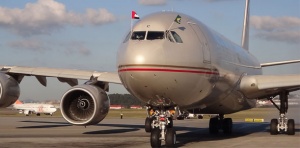Record financial results for Abu Dhabi-based Etihad Airways

Etihad Airways today announced record financial results for 2013, with net profit up 48 per cent to US$62 million on revenues up 27 per cent to US$6.1 billion.
The record performance also saw earnings before interest and tax up 22 per cent to US$208 million and earnings before interest, tax, depreciation, amortisation and rentals up 30 per cent to US$979 million, a margin of 16 per cent of total revenues.
This marked the third successive year of net profitability, in the airline’s tenth year of operation.
James Hogan, president, Etihad Airways, said: “This is another important step forward in our journey as a growing, commercially successful business.
“We have hit every financial target for each of the last seven years, bringing sustainable profitability to a business which has grown from just US$300 million in revenues in 2005 to more than US$6 billion today.
“We have delivered that through our unique strategy, which has seen us combine industry-leading organic growth with wide-ranging partnerships and minority equity investments in strategically important carriers around the world.
“This journey has seen us evolve from a highly successful airline into a growing aviation and travel group, with the infrastructure and strategy to develop even further in our second decade.
“We are particularly pleased to deliver a return for our shareholder, while also playing a major role in the development of trade and tourism within the emirate of Abu Dhabi.”
Revenue increased by 27 per cent to US$6.1 billion, on passenger numbers up 12 per cent 11.5 million.
Revenue Passenger Kilometres – measuring passenger journeys - increased by 16 per cent to 55.5 billion, while Available Seat Kilometres – representing capacity - grew by 17 per cent to 71.1 billion.
These figures reflected strong growth in passenger traffic volumes, in a year when Etihad Airways added six new destinations – Washington DC, Amsterdam, Sao Paulo, Belgrade, Ho Chi Minh City and Sana’a - and increased capacity on 18 existing routes.
At year’s end, the average network-wide seat load factor was 78 per cent, unchanged from 2012.
The airline has announced nine new destinations for 2014 – the US cities of Los Angeles and Dallas-Fort Worth, the European gateways of Rome and Zurich, Jaipur in India, Perth in Western Australia, Phuket in Thailand, Medina in Saudi Arabia and Yerevan in Armenia.
A key driver of Etihad Airways’ growth in 2013 was its partnership strategy, based on wide-ranging codeshares and its unique approach of minority equity investments in strategically important airlines.
This has accelerated network growth, giving it the largest route network of any Middle Eastern carrier, reaching almost 400 destinations; boosted sales and marketing opportunities in key markets around the world; and allowed significant business synergies and cost savings.
This strategy delivered revenues of US$820 million in 2013, up 30 per cent, and represented 21 per cent of total passenger revenues for Etihad Airways.
Hogan said: “Our codeshare partnerships have been an important part of our business performance for the last seven years.
But it is our equity investments which are really taking off now, allowing us to build integrated networks and schedules, develop common products and services and most importantly, identify business and cost synergies.
“These synergies are outstanding.
“Our joint purchasing taskforces are delivering real and significant savings across all equity alliance members, giving each of us real competitive advantage through lower unit costs.”
In addition to its four existing equity partners – airberlin, Air Seychelles, Virgin Australia and Aer Lingus - Etihad Airways announced investments in three additional carriers in 2013.
Regulatory approval was received in November to acquire a 24 per cent stake in India’s Jet Airways.
At year’s end, Etihad Airways was awaiting regulatory approval for two other investments, a 49 per cent stake in Serbia’s national carrier, Air Serbia (formerly Jat Airways) and a 33.3 per cent shareholding in Darwin Airline, a regional carrier based in Switzerland.
In August, Etihad Airways formalised a five-year contract to manage Air Serbia.
Then, in November, Etihad Airways announced the creation of a new sub-brand, Etihad Regional, which Darwin Airline would become the first to adopt.
Etihad Airways also increased its stake in Virgin Australia from nine per cent to 19.9 per cent through incremental on-market purchases, after receiving approval mid-year from Australia’s Foreign Investment Review Board.
Etihad Airways demonstrated further support for Virgin Australia by participating in its AUD$350 million capital raising.
Etihad Airways commenced seven new codeshare partnerships in 2013, entering agreements with South African Airways, Kenya Airways, Air Canada, Korean Air, Air Serbia, Belavia and Air Baltic, taking the portfolio total to 47.
Together with the equity partner airlines, these deals increased the virtual network of Etihad Airways to almost 400 destinations.
“This shows what focused business strategy can deliver,” said Hogan.
“We have identified cargo as a major growth opportunity for Etihad Airways and its partners, and this will be a billion dollar business in 2014.”

